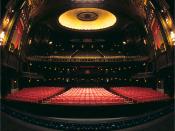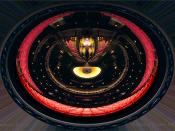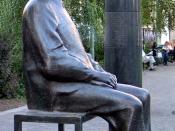The term 'political theatre' has been accepted as defining a left-wing theatre, critical of the capitalist system and expressing in its work the need for radical change. However, most theatre is political in a broad sense, as a playwright usually has a certain ideology that he wants to convey to the audience. In this essay, I will discuss the rise of political theatre, and will concentrate on the two playwrights Bertolt Brecht and John Osborne.
The first organised political theatre in this country was the Workers Theatre Movement, which spanned the period from 1928 to 1938. 1968 saw the upsurge of Alternative Theatre and the formation of several socialist theatre groups. Linking these two movements was the pre-war work of Theatre Union in Manchester and the post-war work of Theatre Workshop.
Although 1928 is the year that marks the beginning of an attempt to organise left-wing theatre on a comparatively widespread scale, political ideology in theatre goes back much further.
The great theatres of all times have been popular theatres that reflected the dreams and struggles of the people. The theatre of Aeschylus and Sophocles, of Shakespeare and Ben Jonson, and of the Commedia dell'-Arte and Moliére derived their inspiration, language, and art from the people.
Living through the social and economic turmoil in the 1920s in Germany, Brecht evolved a new and radical theory of drama. He was the first playwright who ruthlessly made political messages a priority in his plays, seeing the theatre as a means of education and political change, and as a mechanism of revolution. Brecht was an uncompromising Marxist, believing that the only way in which society could develop was through the major social upheaval resulting from a socialist revolution. His main idea was to show things as they really are, and to use...



Brecht's importance
I am very glad that you have decided to bring Mother Courage into your text as it is a perfect example of 'Brechtian' style. The political themes in plays are often very aggressive and catch the audience's attention. It always teaches us something. Great opinions and great overview of the topic!
0 out of 0 people found this comment useful.